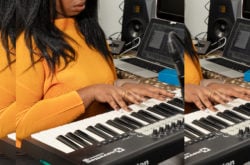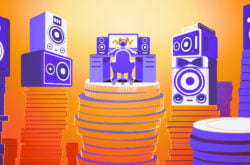There’s no better time than now to start making music.
Thanks in particular to great strides in technology that have been made in recent years, there are more tools and resources than ever that empower you to bring the music that’s in your head to life, entirely on your own. In this article, we share five benefits that you can take advantage of when you embrace a DIY approach as a musician, alongside innovative tools from the likes of ourselves, Mixcloud, iZotope, and others that can be powerful partners in your journey.
Let’s dive in!
1. Independent learning is more accessible than ever
While traditional academic settings and in-person learning still certainly have their merits, they’re no longer a requisite for becoming an incredibly skilled music creator. With nothing but a laptop with internet access, you can explore a near-infinite catalog of articles, tutorials, and videos on virtually any topic in music.
Online courses are definitely an option for those who enjoy the structure and feedback, but there are also so many great free resources out there (including the likes of this very blog you’re reading right now)! You can also consider subscribing to YouTube channels dedicated to music production to get a continuous and self-curated flow of tutorials.
2. Software instruments and sample libraries have come a long way
Maybe you want to create an explosive rock band sound but only have one guitar, or make lush orchestral beds but don’t own a single instrument. While nothing replaces the magic of a professional instrumentalist, there’s no longer the need to let their absence be a roadblock to your creative vision.
Software instruments that emulate real instruments have come an incredibly long way in recent years, and are now frequently used alongside live recordings in the largest pop hits and film scores. Need a great piano sound? Try an instrument in XLN Audio’s Addictive Keys or Arturia’s V Collection. Looking for an entire orchestra? Libraries from the likes of Spitfire and EastWest have you covered.
If you’re looking for samples as opposed to software, there are also platforms like our very own Splice Sounds that allow you to browse and download the exact loops and one-shots you’re looking for. Instead of buying entire packs for just a few sounds, you can get that one guitar progression you need for your track, or a specific collection of drum one-shots that you can load into a sampler to do your own sequencing.
Essentially, with the right mindset you can truly be a ‘one-man-band’. While collaboration can always yield high-quality and creatively exciting results, it’s not essential for you to flesh out the arrangements you’re envisioning.
3. Advanced tools can help you compensate for your blind spots
Historically, one of the ostensible downsides to being a DIY musician has been the existence of various blind spots. If you’re the only one working on your music, you can lose yourself in the weeds and have trouble making more objective decisions in latter stages like mixing and mastering.
While it’s impossible to be perfectly objective (after all, music is inherently subjective), there are several emerging tools that facilitate DIY mixing and mastering in particular. For example, iZotope’s Neutron and Ozone feature a smart Mix Assistant and Master Assistant that help you set goals and match the tone and dynamics of your favorite references. While they won’t do the job for you, these sorts of tools can help you take a step back and work towards the bigger picture that you’re trying to paint with your music.
In terms of your home studio setup, there are also resources like Sonarworks’ SoundID Reference that can help you compensate for the sound coloration and behavior of your specific headphones and speakers. This can help you make sure that your music translates better across a broad range of playback systems and environments.
4. You have the freedom to define your own sound, creative goals, and timelines
An undeniable advantage to taking a DIY approach is that you’re not bounded by anyone but yourself when it comes to your music. With the freedom to define your own sound, creative goals, and timelines, you can fully enjoy experimentation and exploration without compromise.
That said, this also means that you need to be self-disciplined and self-motivated, since no label or peer is going to tell you when and how to create. If you struggle with this, check out our articles on goal setting and time management for musicians to help yourself get off on the right foot.
5. You can collaborate with others as much (or as little) as you want
Part of the beauty of taking a DIY approach to music is that it doesn’t need to be an exclusive or irreversible decision. Along the way, you might become interested in working alongside others, and this will yield its own creative fulfillment.
Fortunately, remote collaboration opportunities that have a low barrier to entry are readily available for you to seek out as you see fit. You can join Discord servers centered around music creation to connect with potential collaborators, or explore platforms like Fiverr to find and hire freelance instrumentalists, producers, and engineers.
Once you’ve found your people, you can take advantage of platforms like Mixcloud and their new Tracks feature, which lets you share unlisted tracks to get private feedback from your collaborators; their livestreaming platform also allows for creators to connect and collaborate in new ways as mediums for live performance continue to evolve.
Keep learning
On that note, if you’re interested in learning about some additional benefits to being a DIY creator from a career building lens, check out Mixcloud’s article for even more insights. The Mixcloud team are dedicated to empowering creators play the music they like, build communities, and get paid directly, and for a limited time, we’re partnering with them so you can get 30% off of your first six months of Mixcloud Pro.
Use the exclusive promo code SPLICE30 at checkout now through June 30th to get 30% off your first six months of Mixcloud Pro:
February 27, 2023



